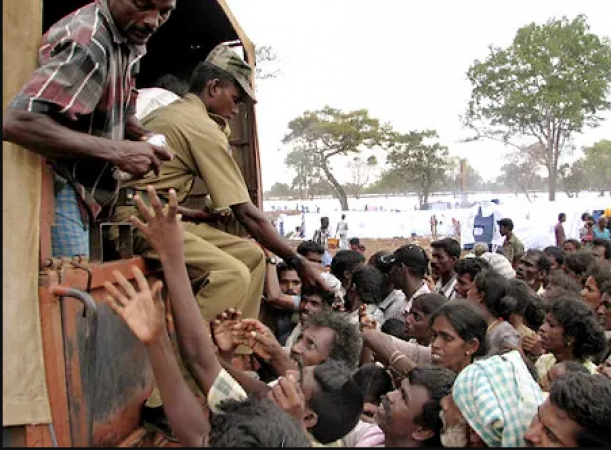
Colombo- Sri Lanka, facing its most profound economic crisis in decades, has declared a state of emergency in response to a series of crises that have precipitated widespread protests and dire shortages of essential goods, including food, fuel, and medicine.
The State of Emergency
The declaration of a state of emergency has bestowed sweeping powers upon the government, enabling the arrest and detention of suspects without charge. It also allows the government to exercise media censorship and restrict freedom of assembly. The government's move came in the wake of hundreds of protesters attempting to storm the president's residence, demanding the resignation of President Gotabaya Rajapaksa, whom they hold responsible for the dire economic straits.
Also Read: North Korea Conducts Intercontinental Ballistic Missile Test, Igniting Global Concerns
The Complex Economic Crisis
Sri Lanka's economic crisis is the outcome of a multitude of factors. The COVID-19 pandemic severely impacted the country's tourism industry, a key economic driver. Additionally, the government's decision to ban the import of chemical fertilizers has led to a decline in agricultural production, exacerbating the nation's food security challenges.
Pervasive Hardship
The economic crisis has inflicted extensive suffering on the Sri Lankan population. Reports of long lines at stores for essential goods have become commonplace, and there have even been instances of food riots. The crisis has significantly eroded the quality of life for many Sri Lankans, who are grappling with skyrocketing prices and limited access to basic necessities.
Also Read: China and Russia's Joint Military Exercises in South China Sea Raise Regional Tensions
The Government's Response
The declaration of a state of emergency underscores the government's efforts to regain control of the situation. Nevertheless, it remains uncertain whether this move will effectively quell further protests or address the fundamental economic issues at the heart of the crisis.
Root Causes and Complex Challenges
Addressing the root causes of Sri Lanka's economic turmoil is a multifaceted challenge. The nation's heavy reliance on tourism revenues left it vulnerable to the COVID-19 pandemic's disruptions. Furthermore, the controversial ban on chemical fertilizers, intended to promote organic farming, inadvertently led to decreased agricultural productivity, exacerbating the food crisis.
International Concerns
The international community, including the United Nations, has voiced concerns over the Sri Lankan government's declaration of a state of emergency. The UN has called on the Sri Lankan government to uphold human rights and ensure that the state of emergency is not misused to suppress dissent. Additionally, the UN has urged the government to address the underlying causes of the economic crisis, emphasizing the importance of a comprehensive response.
A Fluid Situation
Sri Lanka's current situation is marked by its fluidity, making predictions challenging. However, the declaration of a state of emergency serves as an indicator that the crisis is deepening, and the government is grappling with mounting pressure.
The Road Ahead
As Sri Lanka navigates its multifaceted economic crisis, the path forward remains uncertain. International assistance and cooperation may play a pivotal role in addressing the immediate challenges while laying the foundation for sustainable economic recovery. Sri Lankan authorities must confront the complexity of the crisis head-on, focusing on measures that address food security, economic stability, and social welfare.
A National Endeavor
Ultimately, the resolution of Sri Lanka's economic crisis will require a concerted and inclusive effort involving the government, opposition, civil society, and international partners. This crisis serves as a stark reminder of the importance of proactive governance, economic resilience, and robust social safety nets in an increasingly interconnected and uncertain world.
Also Read: Pakistan Thwarts Major Cross-Border Taliban Attack; 4 Soldiers Martyred in Intense Clash
Sri Lanka's declaration of a state of emergency amidst its severe economic crisis underscores the gravity of the situation. The crisis, driven by a range of factors, has inflicted widespread suffering and prompted public discontent. While the state of emergency represents the government's attempt to regain control, addressing the underlying economic challenges is of paramount importance. International engagement and cooperation will likely play a pivotal role in charting a path toward recovery and stability for the nation.